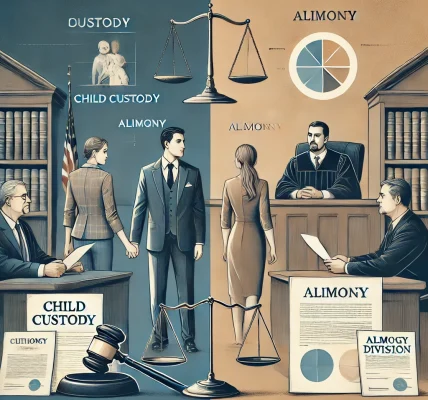Introduction
Divorce can be an emotionally and financially draining process. While many couples assume that litigation is the only way to resolve disputes, mediation offers a peaceful and cost-effective alternative. Mediation allows couples to work together to reach agreements on key issues such as property division, child custody, and spousal support—without the need for a lengthy court battle.
This guide will explore the role of mediation in divorce, its benefits, how it works, and whether it is the right choice for you.
Disclaimer: This article is for informational purposes only and does not constitute legal advice. Divorce laws vary by jurisdiction, and consulting a qualified family law attorney or mediator is recommended before making legal decisions.
What is Divorce Mediation?
Divorce mediation is a voluntary and structured process where a neutral third party (the mediator) helps divorcing couples negotiate and settle disputes amicably. Unlike litigation, where a judge makes the final decision, mediation empowers couples to control the outcome of their divorce.
Key Features of Mediation
- Neutral Mediator: The mediator does not take sides or offer legal advice but facilitates productive discussions.
- Confidential Process: Discussions in mediation remain private, unlike court proceedings, which are public records.
- Mutual Agreement: Both spouses must agree on the terms rather than having a decision imposed by the court.
- Legally Binding Outcome: Once an agreement is reached, it can be formalized into a legal divorce settlement.
Benefits of Divorce Mediation
1. Cost-Effective
Mediation is significantly cheaper than litigation. Court battles involve high attorney fees, filing costs, and prolonged proceedings, while mediation requires fewer sessions and lower legal expenses.
2. Faster Resolution
Traditional divorce cases can take months or even years, whereas mediation can resolve disputes in a matter of weeks or months.
3. Less Emotional Stress
Court battles can be emotionally exhausting. Mediation fosters a cooperative environment, reducing hostility and stress.
4. Better for Children
Divorce is challenging for children, especially when parents are in conflict. Mediation encourages co-parenting and prioritizes the well-being of the children.
5. Flexibility & Control
In mediation, both spouses make decisions together rather than having a judge dictate the terms. This flexibility allows for creative and customized solutions.
6. Confidential & Private
Unlike court proceedings, which are part of public records, mediation is a private process, ensuring personal matters remain confidential.
7. Higher Compliance Rates
Since both parties contribute to the final agreement, they are more likely to adhere to the terms, reducing future disputes.
The Divorce Mediation Process
Step 1: Choosing a Mediator
Couples must select a qualified mediator who specializes in family law. Mediators can be attorneys, former judges, or trained professionals in conflict resolution.
Step 2: Initial Consultation
The mediator meets with both spouses to explain the process, establish ground rules, and outline goals for mediation.
Step 3: Identifying Key Issues
The couple discusses key aspects of the divorce, including:
- Division of assets and debts
- Child custody and visitation schedules
- Child support and spousal maintenance (alimony)
- Any other relevant issues
Step 4: Negotiation Sessions
The mediator facilitates discussions to help spouses find common ground. Sessions are structured to ensure both parties are heard and respected.
Step 5: Drafting the Agreement
Once an agreement is reached, the mediator drafts a formal settlement document, which is reviewed by attorneys before being submitted to the court.
Step 6: Court Approval
The final agreement is presented to a judge for approval. Once approved, it becomes a legally binding divorce settlement.
When is Mediation a Good Option?
Mediation works best when:
- Both spouses are willing to cooperate and negotiate in good faith.
- There are no allegations of domestic violence or abuse.
- Both parties understand their legal rights and responsibilities.
- There is a basic level of trust between spouses.
However, mediation may not be suitable if:
- One spouse is unwilling to compromise.
- There is a history of intimidation, coercion, or domestic abuse.
- There are complex legal issues that require judicial intervention.
Mediation vs. Litigation: Key Differences
| Aspect | Mediation | Litigation |
|---|---|---|
| Cost | Lower | Higher |
| Timeframe | Faster (weeks/months) | Longer (months/years) |
| Decision-Maker | Spouses decide | Judge decides |
| Confidentiality | Private | Public record |
| Emotional Impact | Less adversarial | Often stressful |
| Compliance | Higher (mutual agreement) | Lower (court-imposed decision) |
How to Prepare for Divorce Mediation
1. Gather Necessary Documents
- Financial statements (income, expenses, assets, and debts)
- Property and investment records
- Tax returns and bank statements
- Child-related expenses (if applicable)
2. Identify Your Priorities
- List your must-haves and areas where you are willing to compromise.
- Consider the best interests of the children in custody discussions.
3. Keep an Open Mind
- Be prepared to listen to your spouse’s perspective.
- Focus on solutions rather than conflicts.
4. Consult a Lawyer
- While mediators provide legal guidance, it’s advisable to have an attorney review your final agreement before signing.
Conclusion: Is Mediation Right for You?
Divorce mediation offers a peaceful, cost-effective, and efficient way to navigate the complexities of separation. It allows couples to maintain control over their divorce while reducing emotional stress, legal expenses, and lengthy court battles.
While mediation is not suitable for every divorce case, it remains an ideal choice for couples willing to negotiate amicably. If you are considering mediation, consult with a qualified mediator or family law attorney to understand your rights and ensure the best possible outcome for your future.
By choosing mediation, you can achieve a fair resolution while preserving your dignity, finances, and emotional well-being.




